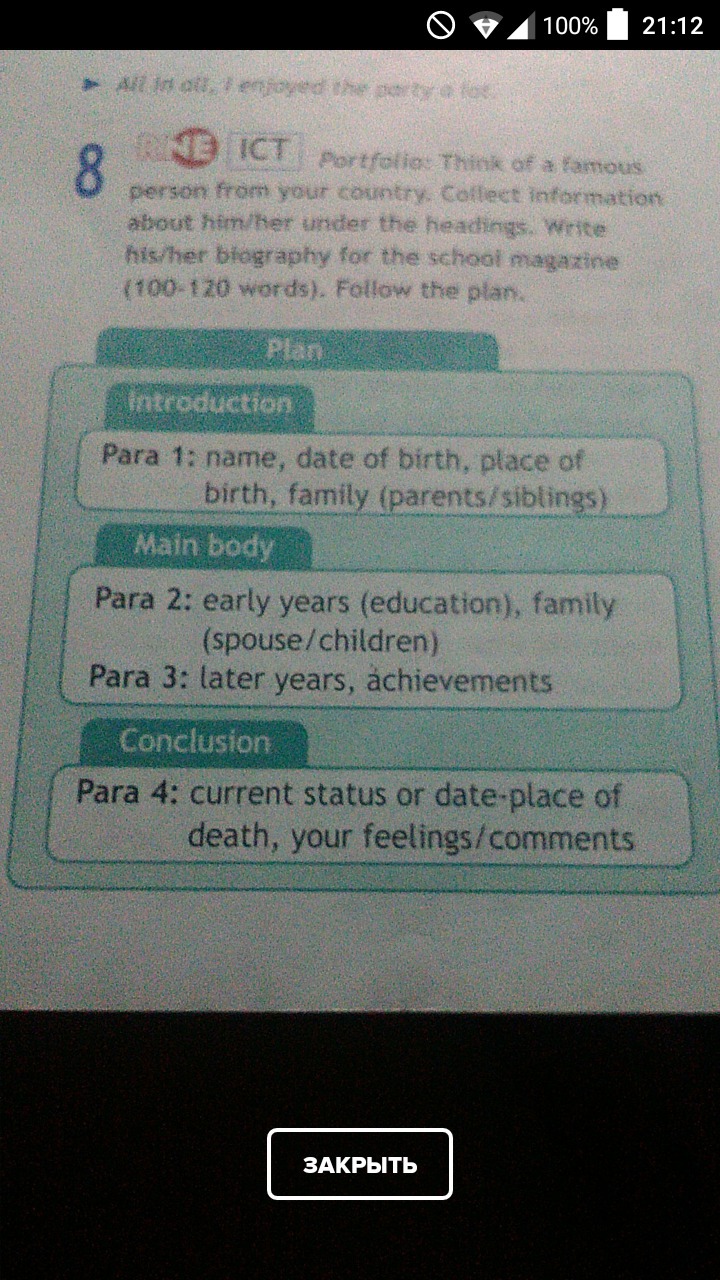напишите биографию какого-либо известного человека из России на английском по плану (100-120 слов). Прошу помочь. Может кто уже делал подобное. ПОЖАЛУЙСТА ПОМОГИТЕ

Ответы
Anna Akhmatova (June 23 [O.S. June 11] 1889 — March 5, 1966) was the pen name of Anna Andreevna Gorenko, the leader and the heart and soul of St Petersburg tradition of Russian poetry in the course of half a century.
Akhmatova's work ranges from short lyric poems to universalized, ingeniously structured cycles, such as Requiem (1935-40), her tragic masterpiece on the Stalinist terror. Her work addresses a variety of themes including time and memory, the fate of creative women, and the difficulties of living and writing in the shadow of Stalinism.
Early life
Akhmatova was born in Bolshoy Fontan near Odessa. Her childhood does not appear to have been happy; her parents separated in 1905. She was educated in Kiev, Tsarskoe Selo, and the Smolny Institute of St Petersburg. Anna started writing poetry at the age of 11, inspired by her favourite poets: Racine, Pushkin, and Baratynsky. As her father did not want to see any verses printed under his "respectable" name, she had to adopt the surname of one of her Tatar ancestors as a pseudonym.
Grey-Eyed King (1910)
Hail to thee, o, inconsolate pain!
The young grey-eyed king has been yesterday slain.
That autumnal evening was stuffy and red.
My husband, returning, had quietly said,
"He'd left for his hunting; they carried him home;
They found him under the old oak's dome.
I pity his queen. He, so young, passed away!...
During one night her black hair turned to grey."
He picked up his pipe from the fireplace shelf,
And went off to work for the night by himself.
Now my daughter I will wake up and rise --
And I will look in her little grey eyes...
And murmuring poplars outside can be heard:
Your king is no longer here on this earth.
In 1910, she married the boyish poet Nikolay Gumilyov, who very soon left her for hunting lions in Africa, the battlefields of the World War I, and the society of Parisian grisettes. Her husband didn't take her poems seriously and was shocked when Alexander Blok declared to him that he preferred her poems to his. Their son, Lev, born in 1912, was to become a famous Neo-Eurasianist historian.
Silver Age
Anna Akhmatova by Amedeo Modigliani, 1911
Enlarge
Anna Akhmatova by Amedeo Modigliani, 1911
In 1912, she published her first collection, entitled Evening. It contained brief, psychologically taut pieces which English readers may find distantly reminiscent of Robert Browning and Thomas Hardy. They were acclaimed for their classical diction, telling details, and the skilful use of colour.
By the time her second collection, the Rosary, appeared in 1914, there were thousands of women composing their poems "after Akhmatova". Her early poems usually picture a man and a woman involved in the most poignant, ambiguous moment of their relationship. Such pieces were much imitated and later parodied by Nabokov and others. Akhmatova was prompted to exclaim: "I taught our women how to speak but don't know how to make them silent".
Together with her husband, Akhmatova enjoyed a high reputation in the circle of Acmeist poets. Her aristocratic manners and artistic integrity won her the titles of the "Queen of the Neva" and the "soul of the Silver Age", as the period came to be known in the history of Russian poetry. Many decades later, she would recall this blessed time of her life in the longest of her works, the "Poem Without Hero" (1940–65), inspired by Pushkin's Eugene Onegin.
The accursed years
Nikolay Gumilyov was executed in 1921 for activities considered anti-Soviet; Akhmatova presently remarried a prominent Assyriologist Vladimir Shilejko, and then another scholar, Nikolay Punin, who died in the Stalinist camps. After that, she spurned several proposals from the married poet Boris Pasternak.
Graduate of the law faculty of Leningrad state University. Since 1977 worked in the counterintelligence investigative Department of the Leningrad Directorate of the KGB[10]. From 1985 to 1990 I served in the residency of Soviet foreign intelligence in East Germany, he worked in Dresden under the cover in the position of Director of the Dresden friendship House USSR—GDR. 20 Aug 1991 with the rank of Colonel, he retired from the KGB. In 1991-1996 worked as an assistant to the rector of Leningrad state University on international Affairs, headed the Committee for external relations of mayor's office of Leningrad, was an adviser to the mayor, first Deputy Chairman of the government of St. Petersburg. Since August 1996 he started to work in Moscow as Deputy Manager of the President of the Russian Federation. After a short stay at the head of the FSB and the post of Secretary of the Russian security Council in August 1999 was appointed Chairman of the Russian Government.
The first person of the state was 31 December 1999, when the decision of the President of the Russian Federation Boris Yeltsin was appointed...<form...